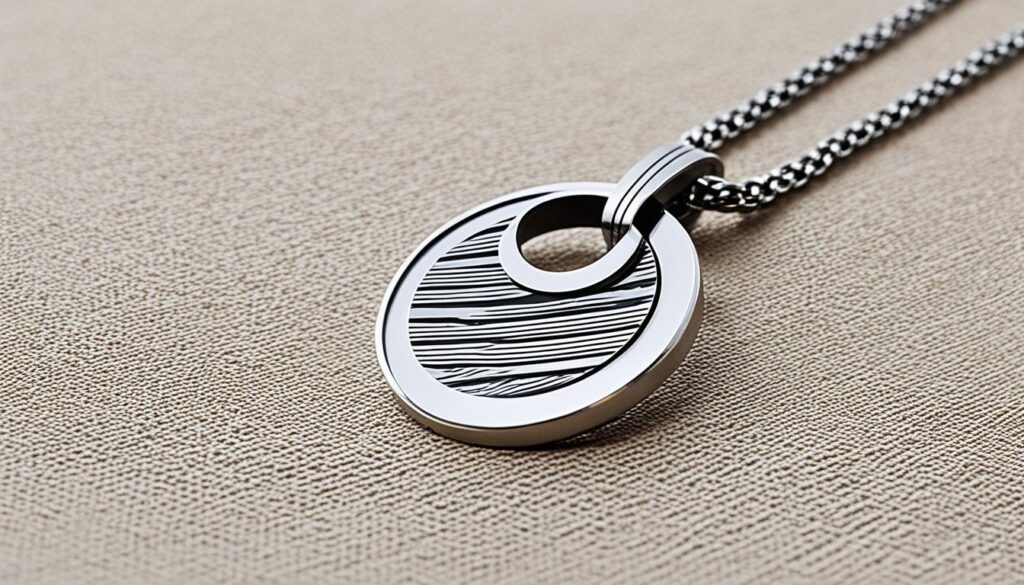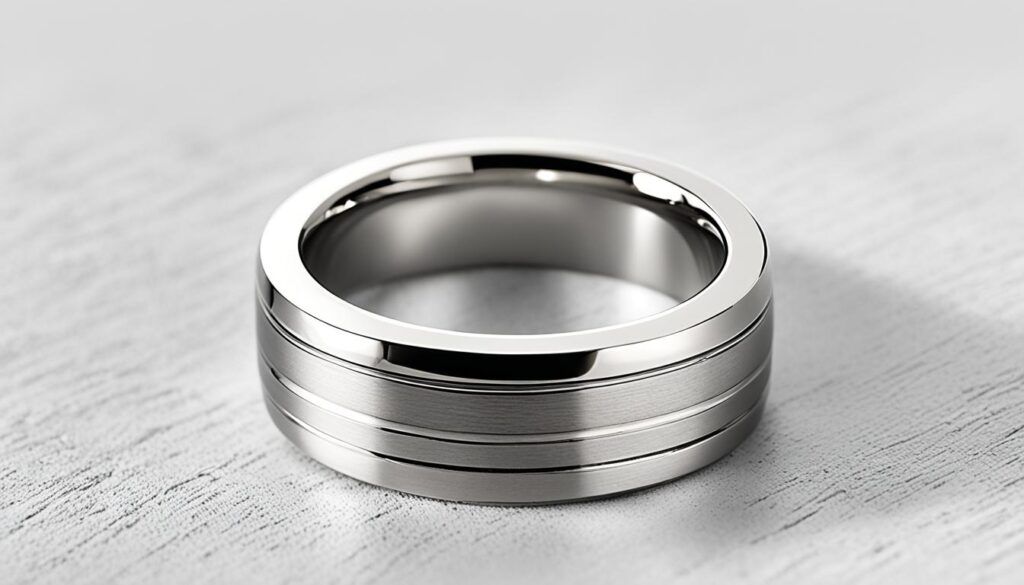Did you know that titanium is more biocompatible and durable than gold when it comes to jewelry? This surprising fact has led many people to question whether titanium is a superior choice to gold for their accessories. To determine which material reigns supreme, let’s delve into the characteristics and properties of both titanium and gold.
- Titanium is more biocompatible and durable compared to gold.
- Golds’ Karat system determines its purity, while titanium comes in different forms and alloys.
- Titanium is highly corrosion resistant and hypoallergenic.
- Gold is generally more expensive than titanium.
- Both titanium and gold offer unique design options to cater to personal preferences.
Understanding Gold for Jewelry
When it comes to gold jewelry, understanding the Karat system and gold purity is essential. The Karat system is used to rank gold based on its purity, with 24K gold being the highest. Let’s explore the different Karat options and their implications for jewelry.
Karat System and Gold Purity
24K Gold: 24K gold is considered pure gold, containing 99.9% gold. It is known for its rich and vibrant yellow color. However, due to its softness, it may not be suitable for everyday wear as it is more prone to scratches and bends.
18K Gold: 18K gold contains 75% gold and 25% other alloys, such as copper or silver. It is a popular choice for jewelry, striking a balance between purity and durability. The added alloys make 18K gold more robust and suitable for daily wear.
14K Gold: 14K gold consists of 58.3% gold and 41.7% other metals. It offers a good combination of durability and affordability. With its slightly higher proportion of alloys, 14K gold is often used for engagement rings and other fine jewelry pieces.
It’s important to note that the lower the Karat, the more likely the gold may contain excessive fillers, which can affect its quality and appearance. On the other hand, higher Karat gold can be too soft for certain types of jewelry, such as body piercings.
Alloys and Allergies
When gold is mixed with alloys, it gains strength and durability, making it better suited for jewelry applications. However, it’s crucial to consider the potential for allergies, especially when wearing gold jewelry over extended periods. Some individuals may be sensitive to nickel, a common alloy used in gold jewelry, which can cause skin irritations or allergic reactions.
It’s always advisable to opt for hypoallergenic gold jewelry or choose alternative metals like titanium for those with a known nickel sensitivity.
Understanding the Karat system and the presence of alloys in gold jewelry allows consumers to make informed choices based on their preferences and sensitivities.
Table: Gold Karat Options and Their Characteristics
| Karat | Gold Content | Other Alloys | Durability | Suitability |
|---|---|---|---|---|
| 24K | 99.9% | None | Soft | Not ideal for daily wear |
| 18K | 75% | 25% (copper, silver) | Moderate | Good for everyday wear |
| 14K | 58.3% | 41.7% (copper, silver) | Moderate | Popular choice for fine jewelry |
Exploring Titanium for Jewelry
Titanium is a versatile metal that has gained popularity in various industries, including jewelry. When it comes to body piercing, titanium jewelry, particularly implant grade titanium, stands out as the preferred choice.
Implant grade titanium is known for its exceptional biocompatibility, making it readily accepted by the body without causing any adverse reactions. This biocompatible metal is highly valued for its hypoallergenic properties, making it suitable for individuals with sensitive skin or metal allergies.
There are different forms and alloys of titanium used in jewelry-making, but one common standard for piercing jewelry is ASTM F136. This standard ensures the quality and safety of the titanium used in piercings. It’s essential to purchase titanium jewelry from reputable brands that provide verifiable mill certificates for their products, guaranteeing the use of high-quality, implant grade titanium.
Titanium Jewelry: The Benefits
Choosing titanium jewelry offers several advantages over other metals:
- Biocompatibility: Titanium is a biocompatible metal, meaning it is less likely to cause skin irritation or allergic reactions.
- Lightweight: Titanium is significantly lighter than gold, making it comfortable to wear for extended periods.
- Strength and Durability: Titanium is highly durable and resistant to scratches and damage.
- Corrosion Resistance: Titanium is corrosion-resistant, ensuring that your jewelry maintains its appearance over time.
- Design Versatility: Titanium can be machined into a variety of unique and modern designs.

| Titanium Jewelry | Benefits |
|---|---|
| Biocompatibility | Readily accepted by the body, hypoallergenic |
| Lightweight | Comfortable for extended wear |
| Strength and Durability | Highly durable, resistant to scratches and damage |
| Corrosion Resistance | Maintains appearance over time |
| Design Versatility | Offers unique and modern designs |
Choosing titanium jewelry ensures that you not only have a stylish accessory but also a piece that is safe, durable, and comfortable to wear.
Durability and Comfort
When it comes to durability, titanium jewelry is in a league of its own. Its exceptional strength and resistance to damage make it an ideal choice for individuals with an active lifestyle. Whether you enjoy outdoor activities or water sports, titanium jewelry is designed to withstand the rigors of your adventurous pursuits. Unlike gold or silver, which can easily break or get lost during these activities, titanium jewelry offers peace of mind and long-lasting wear.
One of the key factors that contribute to titanium’s durability is its remarkable strength to weight ratio. This means that despite its incredible strength, titanium is significantly lighter compared to other metals, including gold. This lightweight characteristic makes titanium jewelry incredibly comfortable to wear, especially for individuals who prefer lightweight accessories.
Cost and Design Options
When it comes to choosing between gold and titanium jewelry, cost and design options play a significant role. Let’s take a closer look at the differences in cost and design elements between these two metals.
Gold vs. Titanium Cost
Gold has long been considered a precious metal, and its value reflects that. As a result, gold jewelry tends to be more expensive compared to titanium jewelry. The price of gold is influenced by factors such as karat purity, weight, and current market conditions.
On the other hand, titanium is a more affordable alternative to gold. The lower price point makes titanium jewelry accessible to a wider range of customers, including those on a budget.
Gold Jewelry Designs
Gold jewelry is known for its intricate and detailed designs. Goldsmiths often create beautiful pieces featuring ornate patterns and settings. Additionally, gold jewelry offers a wide variety of genuine gemstones that can be incorporated into the designs, enhancing their overall aesthetic appeal.
Titanium Jewelry Designs
Titanium jewelry, on the other hand, offers a different design aesthetic. Due to its lightweight and versatile nature, titanium jewelry often features simpler and sleeker designs. Many titanium pieces embrace a modern, minimalist look, making them suitable for those who prefer a more understated style.
Comparing Gold and Titanium Design Options
While gold jewelry may be seen as an upgrade due to its higher price and intricate designs, titanium jewelry offers its own unique appeal with its modern and minimalist designs. The choice ultimately comes down to personal preferences and budget constraints.
| Gold Jewelry | Titanium Jewelry |
|---|---|
| Intricate and detailed designs | Simpler and sleeker designs |
| Wide variety of genuine gemstones | Minimalist aesthetic |
| Higher price range | More affordable |
Both gold and titanium jewelry can be equally safe options for piercings, and the decision on which metal to choose ultimately depends on the individual’s preferences and budget.
Corrosion Resistance and Allergies
When it comes to choosing jewelry, one important consideration is its ability to withstand corrosion and tarnish over time. This is where titanium stands out from other metals like gold and silver. Titanium exhibits exceptional corrosion resistance, making it an ideal choice for those who want their jewelry to maintain its color and shine for a long time.
Unlike gold and silver, which can tarnish and lose their luster over time, titanium stays bright and beautiful with minimal maintenance. The high-polish finish of titanium jewelry ensures that it retains its original appearance, making it an excellent option for those who prefer a polished look.

In addition to its corrosion resistance, titanium also offers hypoallergenic properties. This means that individuals with sensitivities to metals like gold, silver, or nickel can comfortably wear titanium jewelry without worrying about allergic reactions. Hypoallergenic jewelry is becoming increasingly popular, as more people are seeking alternatives to traditional metals.
Titanium is particularly beneficial for those with sensitive skin or allergies, as it does not contain common allergens found in other jewelry materials. This makes it a safe and appealing choice for individuals who want to wear jewelry without the risk of skin irritation or discomfort.
Fashion and Trends
When it comes to jewelry fashion, titanium has become a prominent choice among trendsetters. Its sleek and modern aesthetic adds a unique touch to any ensemble, making it a favored option for individuals seeking fashionable accessories.
Titanium jewelry has the remarkable ability to be combined with gemstones, gold, and silver, allowing for endless design possibilities. The versatility of titanium enables designers to create captivating pieces that can cater to various styles and preferences.
What sets titanium jewelry apart is its anodization process, which involves adding an oxide layer to the metal’s surface. This process not only enhances its durability but also provides an opportunity to introduce captivating colors to the jewelry. From vibrant hues to subtle gradients, anodized titanium jewelry can truly stand out and make a bold fashion statement.
Exquisite Designs and Fashion Collaborations
Leading fashion brands and designers are constantly exploring new ideas and pushing the boundaries of titanium jewelry. They incorporate innovative techniques and materials to create pieces that are both visually striking and representative of current fashion trends.
Collaborations between renowned jewelry designers and fashion houses have resulted in stunning collections that showcase titanium’s versatility and potential. These collaborations have further elevated titanium jewelry’s status within the fashion industry, attracting a wider audience and expanding its popularity.
The Appeal of Unique and Eye-Catching Jewelry
One of the main draws of titanium jewelry is its ability to offer something different and unique. With its sleek and contemporary appearance, titanium jewelry stands out from traditional gold and silver pieces, capturing attention and sparking conversations.
Whether it’s a statement necklace, an elegant ring, or a stylish bracelet, trendy titanium jewelry allows individuals to express their personal style while staying ahead of fashion trends. The wide range of designs, from minimalist to intricately detailed, ensures that everyone can find their perfect piece to complement their individuality.
Overall, titanium jewelry represents a fresh and modern approach to accessorizing. Its stylish designs, endless possibilities for customization, and compatibility with other precious metals and gemstones make it a sought-after choice for individuals who want to make a fashion statement with their jewelry.
Conclusion
In conclusion, when it comes to choosing between titanium and gold for jewelry, both materials have their own pros and cons. Titanium is highly biocompatible and durable, making it an excellent choice for individuals with sensitive skin or those who lead an active lifestyle. Its corrosion resistance and hypoallergenic properties make it a safe option for piercings. On the other hand, gold offers a wide range of intricate designs and the option to incorporate precious gemstones, providing a luxurious and classic appeal.
The decision between titanium and gold ultimately depends on personal preferences, budget, and the specific requirements of the jewelry piece. Titanium offers a more affordable alternative without compromising on quality, while gold may be seen as a symbol of status and elegance. Both materials are considered safe for piercings and offer unique options for individuals to express their style and personality.
In summary, the choice between titanium and gold is subjective and should be based on individual needs. Consider the desired aesthetic, durability, budget, and any specific sensitivities or preferences. Whether you opt for the modern appeal of titanium or the timeless elegance of gold, both materials have their own allure and can provide a beautiful and meaningful piece of jewelry to cherish for years to come.
FAQ
Is titanium better than gold for jewelry?
Both titanium and gold have their own advantages. Titanium is highly durable, lightweight, and biocompatible, making it suitable for active individuals. On the other hand, gold offers intricate designs and a wider range of gemstones.
What is the Karat system used for gold?
The Karat system denotes the purity of gold. For example, 24K gold is pure gold, while 18K and 14K gold contain a mixture of gold and other alloys.
Why is titanium considered biocompatible?
Titanium is considered biocompatible because it is readily accepted by the body without causing adverse reactions. Implant grade titanium, in particular, is commonly used for body piercings.
Is titanium jewelry more durable than gold jewelry?
Yes, titanium is highly durable and resistant to damage. It is ideal for individuals who engage in outdoor activities or water sports, as it is less likely to break or get lost compared to gold.
How does the cost of titanium compare to gold?
Gold is generally more expensive than titanium due to its precious nature. Gold jewelry often features intricate designs and a wide variety of gemstones, while titanium jewelry offers simpler, machined designs at a more affordable price.
Is titanium resistant to corrosion and tarnishing?
Yes, titanium is highly corrosion resistant and does not tarnish easily. This makes it a favorable choice for high-polish finished jewelry that maintains its color and shine over time.
Is titanium hypoallergenic?
Yes, titanium is hypoallergenic, making it suitable for individuals with sensitivities to gold, silver, or nickel commonly found in traditional jewelry.
Is titanium jewelry fashionable?
Yes, titanium jewelry offers a modern and trendy aesthetic. It can be combined with gemstones, gold, and silver, and can be anodized to create captivating colors. The fashion industry continuously explores new ideas and designs with titanium.



